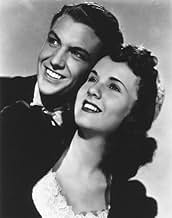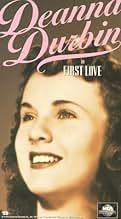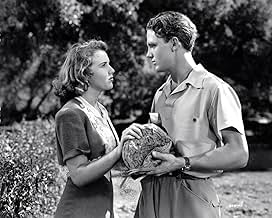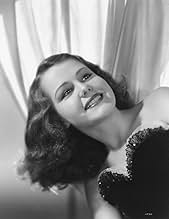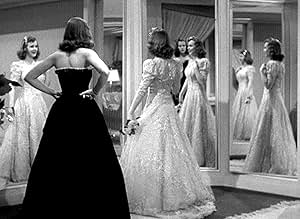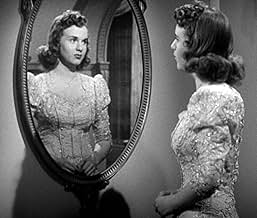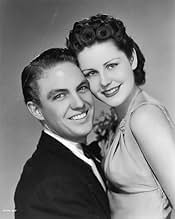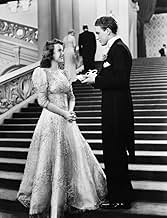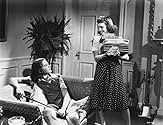An orphaned boarding school graduate secretly attends a prestigious ball, where she falls for the boyfriend of her snobbish cousin.An orphaned boarding school graduate secretly attends a prestigious ball, where she falls for the boyfriend of her snobbish cousin.An orphaned boarding school graduate secretly attends a prestigious ball, where she falls for the boyfriend of her snobbish cousin.
- Nominated for 2 Oscars
- 4 wins & 2 nominations total
Featured reviews
I'll take my Cinderella with Prokovief, but after watching First Love, a first-rate film with a quease-inducing title, I'll place this Deanna Durbin vehicle second.
"You go up there to New York," says Miss Wiggins, a crotchety, spinster music teacher, to Connie Harding, who has just graduated from a fancy private school. "Make those people love you just as much as we do." Connie is an orphan, and Miss Wiggins is referring to her uncle and his family, wealthy New Yorkers who have paid all her bills but were just too busy to drive down for her graduation. They sent one of the family's limousines for her. "And then," Miss Wiggins says, "maybe, someday, you will meet a prince, and you'll live happily ever after."
"Those fairy stories haven't come true for over 100 years, Miss Wiggins," Connie says.
Miss Wiggins thumps the floor with her cane. "Fiddlesticks! We just have to dust them off...streamline them a bit."
And this is what director Henry Koster, one of the best of Durbin's directors, has managed to do. He is aided immeasurably by a clever script ("This is terrible," says Barbara, Connie's awful cousin, "I can't be more than an hour and a half late to Wilma's party...she's one of my personal friends!") and solid, pungent performances by some very good character actors. The story's sweetness is genuine, based on the intrinsic sympathy for a young girl who manages to overcome obstacles with the help of others, and then finds happiness. Deanna Durbin at 18 is an intriguing combination of naturalness and skill. We like her the moment we see her, and her ability to win us over is enhanced when we meet the family. Her uncle (Eugene Palette) is a gruff man who seemingly only wants to keep far away from his wife and children, as well as away from Connie. When we meet the rest of the family, we sympathize with him. His wife (Leatrice Joy) is unpleasantly scatter-brained. His daughter (Helen Parish), a year older than Connie, is a snobbish, selfish, manipulating terror. His son (Lewis Howard) is so languid he make laziness seem tiring.
There's a lavish ball, and Connie gets to go thanks to the intervention of the servants, led by that great butler-playing specialist, Charles Coleman. She meets a prince of a wealthy young man, Ted Drake (whom she met once before with mud on her face). When they waltz at the ball, all the other dancers fade away in a clever bit of instant love setting by Koster. Then Durbin receives her first screen kiss, from Robert Stack as Ted, as naturally as she acts. After the usual ups and downs for Cinderella, there's a happy ending which involves a matching slipper. Her uncle becomes the worm who turns, dealing brisk and satisfying retribution to his family, and even Miss Wiggins smiles. We are assured that Connie and Ted live happily ever after.
Durbin sings two or three songs, including the hoary old tear-jerker "There's No Place Like Home." More impressively, she sings "Un Bel Di." Impressively, because not many 18-year- olds I've heard of would be able to handle the emotions Puccini lays on with such a trowel. The aria is a tear-jerker, too, but a great one. It takes a singer who knows what she's doing to handle the emotions (in Italian) as well as the notes. Durbin carries it off impressively with her usual uncanny poise.
First Love, except for that title, is completely and satisfyingly charming.
"You go up there to New York," says Miss Wiggins, a crotchety, spinster music teacher, to Connie Harding, who has just graduated from a fancy private school. "Make those people love you just as much as we do." Connie is an orphan, and Miss Wiggins is referring to her uncle and his family, wealthy New Yorkers who have paid all her bills but were just too busy to drive down for her graduation. They sent one of the family's limousines for her. "And then," Miss Wiggins says, "maybe, someday, you will meet a prince, and you'll live happily ever after."
"Those fairy stories haven't come true for over 100 years, Miss Wiggins," Connie says.
Miss Wiggins thumps the floor with her cane. "Fiddlesticks! We just have to dust them off...streamline them a bit."
And this is what director Henry Koster, one of the best of Durbin's directors, has managed to do. He is aided immeasurably by a clever script ("This is terrible," says Barbara, Connie's awful cousin, "I can't be more than an hour and a half late to Wilma's party...she's one of my personal friends!") and solid, pungent performances by some very good character actors. The story's sweetness is genuine, based on the intrinsic sympathy for a young girl who manages to overcome obstacles with the help of others, and then finds happiness. Deanna Durbin at 18 is an intriguing combination of naturalness and skill. We like her the moment we see her, and her ability to win us over is enhanced when we meet the family. Her uncle (Eugene Palette) is a gruff man who seemingly only wants to keep far away from his wife and children, as well as away from Connie. When we meet the rest of the family, we sympathize with him. His wife (Leatrice Joy) is unpleasantly scatter-brained. His daughter (Helen Parish), a year older than Connie, is a snobbish, selfish, manipulating terror. His son (Lewis Howard) is so languid he make laziness seem tiring.
There's a lavish ball, and Connie gets to go thanks to the intervention of the servants, led by that great butler-playing specialist, Charles Coleman. She meets a prince of a wealthy young man, Ted Drake (whom she met once before with mud on her face). When they waltz at the ball, all the other dancers fade away in a clever bit of instant love setting by Koster. Then Durbin receives her first screen kiss, from Robert Stack as Ted, as naturally as she acts. After the usual ups and downs for Cinderella, there's a happy ending which involves a matching slipper. Her uncle becomes the worm who turns, dealing brisk and satisfying retribution to his family, and even Miss Wiggins smiles. We are assured that Connie and Ted live happily ever after.
Durbin sings two or three songs, including the hoary old tear-jerker "There's No Place Like Home." More impressively, she sings "Un Bel Di." Impressively, because not many 18-year- olds I've heard of would be able to handle the emotions Puccini lays on with such a trowel. The aria is a tear-jerker, too, but a great one. It takes a singer who knows what she's doing to handle the emotions (in Italian) as well as the notes. Durbin carries it off impressively with her usual uncanny poise.
First Love, except for that title, is completely and satisfyingly charming.
Two very young actors make up this cinderella story, Robert Stack (just 20) is the hero and Deanna at 18 still has quite a bit of puppy fat on her face (I didn't like the hair style - was it to make her seem older? ). She, an Orphan like Cinderella lands up in - not step mother here, but rich maternal uncle's home. Here of course there was one cousin, of the step-sister type the other cousin of opposite gender, the aunt and even the uncle are really not villainish by nature, but villain by the lack of empathy, not only towards our Cinderella, but towards the whole world.
There are of course nice songs too, has to be when Deanna is there. The movie is well made, and very watch-able, and of course the end is predictable in any fairy tale. Along with Deanna there are two more lovely girls, Helen Parish (the Cousin), a quite frequent co-actor of Deanna, and June Storey, another Canadian, both trying to win the Prince Charming.
There are two interesting things here, one puzzled me, till I understood what it was and other one, the main song, wasn't properly visualised.
If there is a call to sing a Strauss' waltz, even if you specify it is the Junior's, unless you know which one it is, no one can sing it. More so, it had been told to have a bit of modifications, some bars were changed, probably to cater to her voice-spectrum by the singer, Mme Cottellini, who was supposed to sing it, mentioned. Even more problem in it was, that even had she caught the opening, she still would have been in for a trouble, since it was a mix of three of Strauss' Waltzs, Schatz-Walzer, the beautiful Rosen aus dem Süden(the main body) and lagunen Walzer (finale) : unless one knows that, it would be impossible.
The interesting and wonder-ful (not necessary wonderful) portion was, after this waltz, when Deanna was dancing with Stack, I observed there was something in her left hand, what was it I wondered.... and then it struck me. That was the cloak-ticket. And she had retained it, held between the forefinger and middle finger of her hand, till she exchanged it for cloak. In fact she had been playing with it, even during the 'spring waltz'. This was unexpected that one would go for that much precision. I wonder who thought about it, Koster or Deanna ? I am sure the viewers won't have noticed it, or even wondered if it wasn't there (you could have some pocket or fold in the dress to keep it).
There are of course nice songs too, has to be when Deanna is there. The movie is well made, and very watch-able, and of course the end is predictable in any fairy tale. Along with Deanna there are two more lovely girls, Helen Parish (the Cousin), a quite frequent co-actor of Deanna, and June Storey, another Canadian, both trying to win the Prince Charming.
There are two interesting things here, one puzzled me, till I understood what it was and other one, the main song, wasn't properly visualised.
If there is a call to sing a Strauss' waltz, even if you specify it is the Junior's, unless you know which one it is, no one can sing it. More so, it had been told to have a bit of modifications, some bars were changed, probably to cater to her voice-spectrum by the singer, Mme Cottellini, who was supposed to sing it, mentioned. Even more problem in it was, that even had she caught the opening, she still would have been in for a trouble, since it was a mix of three of Strauss' Waltzs, Schatz-Walzer, the beautiful Rosen aus dem Süden(the main body) and lagunen Walzer (finale) : unless one knows that, it would be impossible.
The interesting and wonder-ful (not necessary wonderful) portion was, after this waltz, when Deanna was dancing with Stack, I observed there was something in her left hand, what was it I wondered.... and then it struck me. That was the cloak-ticket. And she had retained it, held between the forefinger and middle finger of her hand, till she exchanged it for cloak. In fact she had been playing with it, even during the 'spring waltz'. This was unexpected that one would go for that much precision. I wonder who thought about it, Koster or Deanna ? I am sure the viewers won't have noticed it, or even wondered if it wasn't there (you could have some pocket or fold in the dress to keep it).
This 1939 take on 'Cinderella' works like a charm, and I honestly would never have guessed as much. I found myself being continuously bewitched by it, its sincerely touching and funny script and dialogue, the wealth of small character parts from the laconic spinster teacher ("Old maids are only happy when they cry, you'll find out") and the personable servants to the zany rich family that Durbin's orphan girl has to stand up to.
And of course, over and above everything else, there is Deanna Durbin, a full-fledged young leading lady with a miraculous voice and loads of screen presence and pathos (listen to her sing 'Un bel dì' from 'Madame Butterfly' at the end!). Blonde hunk Robert Stack has his first part ever as the Prince Charming who is left with the empty slipper, but only after a gorgeous series of incredibly romantic encounters.
And of course, over and above everything else, there is Deanna Durbin, a full-fledged young leading lady with a miraculous voice and loads of screen presence and pathos (listen to her sing 'Un bel dì' from 'Madame Butterfly' at the end!). Blonde hunk Robert Stack has his first part ever as the Prince Charming who is left with the empty slipper, but only after a gorgeous series of incredibly romantic encounters.
Deanna Durbin is the poor cousin of a rich family. She attends Kathleen Howard's girl's school with cousin Helen Parish, and gets invited to their New York mansion for Christmas break. Even though uncle Eugene Pallette seems nice enough -- what little is seen of him -- the rest of the family is a bunch of weirdos and nasties. She wants to go to the ball, but has to wear cast-off clothes. But the mansion's staff, who adore her for singing for them, club together and rent an expensive outfit. When Miss Parish orders her not to go to the ball....
Miss Durbin was Universal's biggest star, but how were they to deal with the fact that she was now 17 and could no longer be Little Miss Fix-It? Her production team, consisting of Henry Koster and Joe Pasternak decided to write her a Cinderella story, with newly-hired Robert Stack as Prince Charming. Of course there are musical interludes, an old-fashioned ballad or two, and a selection of opera arias. The writing team kept everything familiar, including borrowing liberally from My Man Godfrey to make sure that Miss Durbin's fans wouldn't be too outraged.
Miss Durbin was Universal's biggest star, but how were they to deal with the fact that she was now 17 and could no longer be Little Miss Fix-It? Her production team, consisting of Henry Koster and Joe Pasternak decided to write her a Cinderella story, with newly-hired Robert Stack as Prince Charming. Of course there are musical interludes, an old-fashioned ballad or two, and a selection of opera arias. The writing team kept everything familiar, including borrowing liberally from My Man Godfrey to make sure that Miss Durbin's fans wouldn't be too outraged.
A maturing DEANNA DURBIN and a strikingly handsome young ROBERT STACK are the enjoyable romantic leads in this Cinderella tale that spins along with a few Durbin songs tossed in for good measure.
Deanna plays the orphaned cousin of a rich and snobbish family that tries to get her to stay home from a lavish ball. With the help of servants (instead of mice), Deanna gets to attend the ball, delivers an outstanding solo, meets the handsome "prince" (Stack) and has to fend off the insults of her snobbish cousin (Helen Parrish).
The slight plot moves effortlessly toward a happy ending. Durbin fans should love this one--it's easy to take and easy to love. Eugene Pallette gives a fine comic performance as her gruff uncle and the rest of the cast does a professional job under Henry Koster's direction.
Deanna plays the orphaned cousin of a rich and snobbish family that tries to get her to stay home from a lavish ball. With the help of servants (instead of mice), Deanna gets to attend the ball, delivers an outstanding solo, meets the handsome "prince" (Stack) and has to fend off the insults of her snobbish cousin (Helen Parrish).
The slight plot moves effortlessly toward a happy ending. Durbin fans should love this one--it's easy to take and easy to love. Eugene Pallette gives a fine comic performance as her gruff uncle and the rest of the cast does a professional job under Henry Koster's direction.
Did you know
- TriviaDeanna Durbin's character gives her birthdate as 4 December - Durbin's own.
- GoofsThe movement of Deanna during the scene with her mirror.
- Quotes
Miss Wiggins: The trouble with you young people is you don't believe in anything. You're afraid, afraid of hope, afraid of happiness.
- ConnectionsFeatured in Hers to Hold (1943)
- How long is First Love?Powered by Alexa
Details
- Runtime
- 1h 24m(84 min)
- Color
- Aspect ratio
- 1.37 : 1
Contribute to this page
Suggest an edit or add missing content

